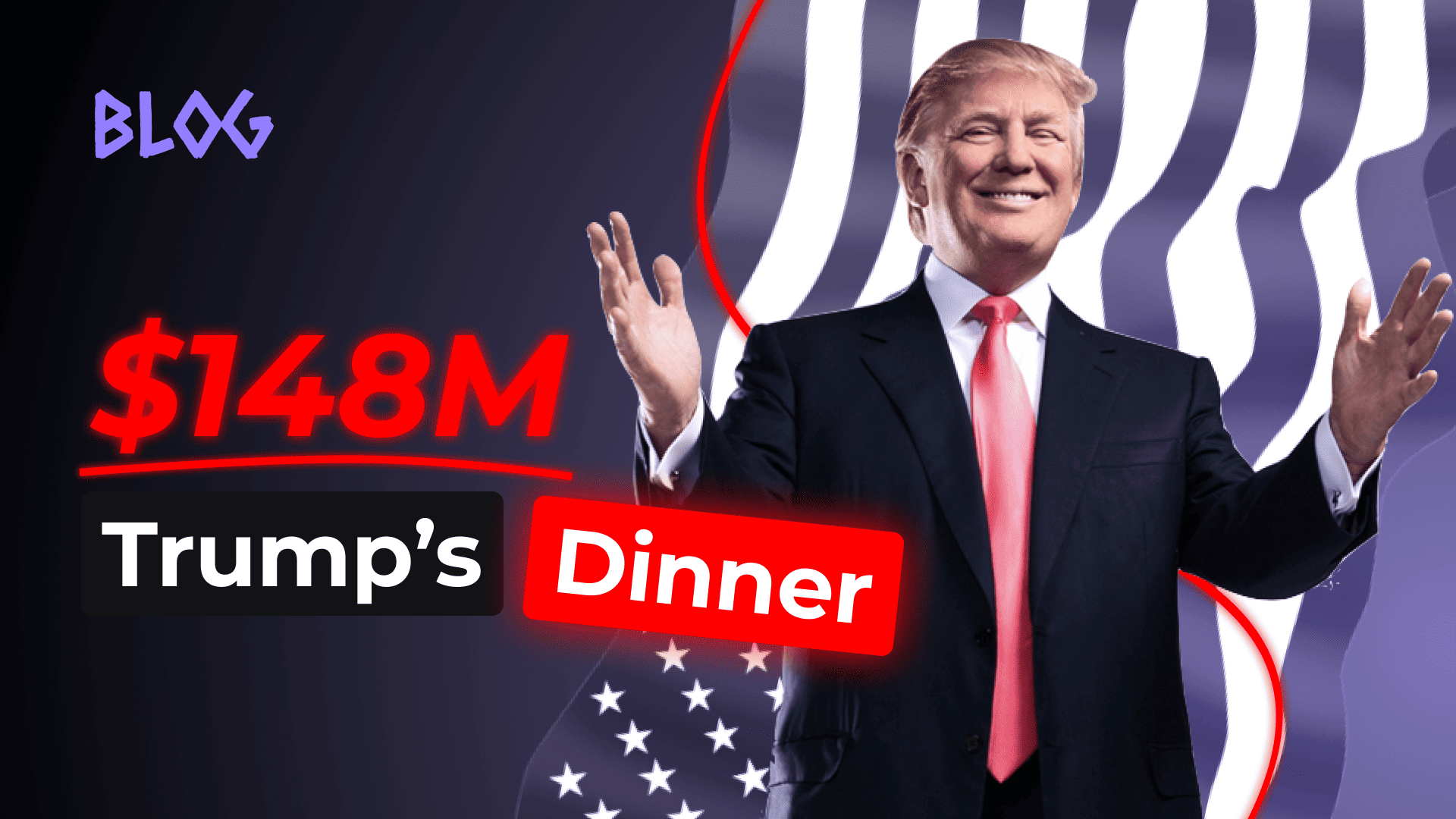2025-06-11 14:27:27
Trump Hosts Meme Coin Moguls: $148M Dinner Sparks Political Uproar

At a private country club in Virginia, cryptocurrency moguls recently gathered for a lavish dinner hosted by President Donald Trump. The $148 million event was more than just a night of luxury; it has become a lightning rod for controversy in Washington.
With top meme coin investors flying in from around the world, including crypto billionaires and masked influencers, the exclusive gathering has sparked outrage from lawmakers who see it as a blatant display of wealth, influence, and a new form of political fundraising. But the deeper story lies in who profits, who loses, and what this all means for the future of crypto politics in America.
An Evening of Luxury and Power
The Trump National Golf Club became the epicenter of crypto spectacle when President Trump welcomed the top 25 holders of the $TRUMP meme coin for a black-tie dinner. The event was part of a promotional campaign that encouraged crypto investors to buy into the meme coin for a chance to dine with the former president. In total, over $148 million was spent by attendees, with the top 25 wallets alone contributing more than $111 million.
Among the attendees was crypto billionaire Justin Sun, who claimed the top wallet spot with an $18.5 million stake. Sun, who has previously faced scrutiny from the U.S. Securities and Exchange Commission (SEC), attended both the dinner and a VIP cocktail reception. Though the SEC had paused its fraud case against him earlier this year, his appearance and social media celebration of the event was met with sharp criticism.
Exclusive perks included a limited-edition $100,000 Trump-branded watch for the top four holders and a behind-the-scenes VIP tour, initially rumored to include the White House, though that detail was later removed from the official website.
A Divisive Event Draws Political Fire
Outside the venue, protesters gathered with signs denouncing the dinner as a “crypto corruption” scandal and demanding transparency about who was attending. Their concerns were echoed on Capitol Hill, where Democratic lawmakers held a press conference to denounce what they called a new low in political fundraising.
Senator Elizabeth Warren labeled the dinner an “orgy of corruption,” while Senator Chris Murphy raised alarms over the anonymity of some attendees, pointing to a guest known only as “Ogle,” a masked security consultant with ties to Trump’s crypto platform. Critics argue that the event blurs the line between political influence and financial gain, especially since many of the top coin holders are based outside the United States.
In response, the White House maintained that all of President Trump’s assets are managed through a blind trust overseen by his children, downplaying concerns over impropriety.
Winners and Losers in the Meme Coin Game
While the dinner was a glamorous showcase for elite investors, the underlying numbers paint a more troubling picture. According to blockchain analysts, over 60 large wallets have earned nearly $1.5 billion from the $TRUMP coin, with $48 million in profits made after the dinner announcement alone.
By contrast, smaller investors have fared poorly. Around 600,000 wallets have lost a combined $3.87 billion, with $117 million of that wiped out in the lead-up to the event. These figures highlight a deepening divide in the crypto space, where wealth and insider access appear to disproportionately favor the already affluent.
For some, the dinner served as a reminder of how meme coins can act as vehicles for speculative fervor and elite networking, while everyday investors are left holding the bag.
Global Players and Hidden Agendas
The international presence at the event has raised red flags for U.S. lawmakers. Reports indicate that more than half of the attendees were likely foreign nationals. Figures like Sheldon Zia, founder of Cayman-based BitMart, and “Ice,” co-founder of Singapore’s MemeCore, traveled thousands of miles to attend. Ice, who came in second in the contest, reportedly spent over $16 million to secure his seat at the table.
While some argue this reflects the global nature of cryptocurrency, critics worry about foreign influence over American politics. The blurred lines between crypto assets, political contributions, and personal access to powerful figures could open doors for regulatory scrutiny.
A Celebration of Crypto or a Warning Sign?
Trump used the dinner to champion his pro-crypto stance, criticizing the Biden administration for what he called its persecution of digital innovators. His message played well with the audience, many of whom see crypto as the future of finance and political fundraising.
But not all Republicans are cheering. Senator Cynthia Lummis, a longtime crypto advocate, expressed concern over the optics of the event, calling it “a moment that gives me pause.”
Despite the controversy, the Trump family's crypto ventures continue to expand. From meme coins and NFTs to a new stablecoin and crypto exchange, their growing presence in the digital asset market is reshaping the conversation about politics, money, and influence in the 21st century.
Final Thoughts
The $TRUMP meme coin dinner may have been a one-night event, but its implications are long-lasting. It exposed the rising tide of crypto's intersection with politics, the growing influence of mega-investors, and the risks of unregulated fundraising tools in national campaigns.
While Trump’s supporters view the dinner as a celebration of digital innovation, critics see it as a warning sign of unchecked financial power influencing the highest levels of government. As lawmakers call for new regulations, and watchdogs demand greater transparency, the crypto-political landscape is poised for a reckoning. One thing is clear: the fusion of crypto and politics is no longer theoretical, it’s already here.






 Podziel się
Podziel się

